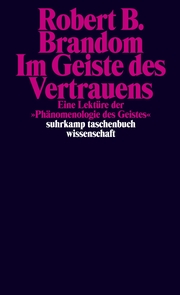A Companion to Phenomenology and Existentialism (E-Book, PDF)
A Companion to Phenomenology and Existentialism
eBook - Blackwell Companions to Philosophy
Bibliographische Informationen
Format: Digitale Rechteverwaltung: Adobe DRM
Beschreibung
Autorenportrait
Mark A. Wrathall is Associate Professor of Philosophy at Brigham Young University. He is the editor ofReligion after Metaphysics (2003),Heidegger Re-examined (with Hubert L. Dreyfus, 2002),Heidegger, Authenticity, and Modernity (with Jeff Malpas, 2000),Heidegger, Coping, and Cognitive Science (with Jeff Malpas, 2000), andAppropriating Heidegger (with James Falconer, 2000). Hubert L. Dreyfus and Mark A. Wrathall are also the joint editors ofA Companion to Heidegger (Blackwell, 2005).
Inhalt
List of Illustrations viii
Notes on Contributors ix
Acknowledgments xiv
1 A Brief Introduction to Phenomenology and Existentialism 1Mark A. Wrathall and Hubert L. Dreyfus
PART I PHENOMENOLOGY 7
MAIN MOVEMENTS 8
2 Husserlian Phenomenology 9Steven Crowell
3 Existential Phenomenology 31Mark A. Wrathall
4 French Phenomenology 48François-David Sebbah
CENTRAL CONCEPTS 68
5 Intentionality 69J. N. Mohanty
6 Consciousness 78Charles Siewert
7 The Lifeworld and Lived Experience 91Martin Jay
8 Husserls Reductions and the Role They Play in His Phenomenology 105Dagfinn Føllesdal
9 Categorial Intuition 115Dieter Lohmar
10 Temporality 127John B. Brough and William Blattner
PART II EXISTENTIALISM 135
MAIN MOVEMENTS 136
11 The Roots of Existentialism 137Hubert L. Dreyfus
12 German Existence-Philosophy 162Udo Tietz
13 Religious Existentialism 188Clancy Martin
14 French Existentialism 206Robert Wicks
CENTRAL CONCEPTS 228
15 The Concept of Authenticity 229Taylor Carman
16 Affectivity 240Béatrice Han-Pile
17 The Body 253Piotr Hoffman
18 Freedom and Responsibility 263Frederick A. Olafson
19 Absurdity 271David Sherman
20 Death 280David Couzens Hoy
PART III CONTEMPORARY ISSUES IN PHENOMENOLOGY AND EXISTENTIALISM 289
21 Emotions in Phenomenology and Existentialism 291Robert C. Solomon
22 The Egological Structure of Consciousness: Lessons from Sartre for Analytical Philosophy of Mind 310Manuel Bremer
23 Phenomenology, Neuroscience, and Intersubjectivity 329Matthew Ratcliffe
24 The Intrinsic Spatial Frame of Reference 346Shaun Gallagher
25 Action, the Scientific Worldview, and Being-in-the-World 356Craig DeLancey
26 Phenomenology in Artificial Intelligence and Cognitive Science 377Daniel Andler
27 Phenomenological Currents in Twentieth-Century Psychology 394Frederick J. Wertz
28 Medicine 412Fredrik Svenaeus
29 Realism, Science, and the Deworlding of the World 425Peter Eli Gordon
30 Environmental Philosophy 445Iain Thomson
31 Ontology, Pragmatism, and Technology 464Shunsuke Kadowaki
32 The Lived-Body and the Dignity of Human Beings 478Andreas Brenner
33 Sexuality 489Ann V. Murphy
34 Feminism 502Sara Heinämaa
35 A Life Worth Living 516Julian Young
36 The Search for Immediacy and the Problem of Political Life in Existentialism and Phenomenology 531Michael Allen Gillespie
37 History and Historicity 545Charles Guignon
38 Bubbles and Skulls: The Phenomenology of Self-Consciousness in Dutch Still-Life Painting 559Wayne M. Martin
39 Mathematics 585Mark van Atten
Index 600
E-Book Informationen
„eBooks“ sind digitale Bücher. Um eBooks lesen zu können, wird entweder eine spezielle Software für Computer, Tablets und Smartphones oder ein eBook-Reader benötigt. Da es eBooks in unterschieldichen Formaten gibt, gilt es, folgendes zu beachten.
Von uns werden digitale Bücher in drei Formaten ausgeliefert. Die Formate sind EPUB mit DRM (Digital Rights Management), EPUB ohne DRM und PDF. Bei den Formaten PDF und EPUB ohne DRM müssen Sie lediglich prüfen, ob Ihr eBook-Reader kompatibel ist. Wenn ein Format mit DRM genutzt wird, besteht zusätzlich die Notwendigkeit, dass Sie einen kostenlosen Adobe® Digital Editions Account besitzen. Wenn Sie ein eBook, das Adobe® Digital Editions benötigt, herunterladen, erhalten Sie eine ASCM-Datei, die zu Digital Editions hinzugefügt und mit Ihrem Account verknüpft werden muss. Einige eBook-Reader (zum Beispiel PocketBook Touch) unterstützen auch das direkte Eingeben der Login-Daten des Adobe Accounts – somit können diese ASCM-Dateien direkt auf das betreffende Gerät kopiert werden.
Da eBooks nur für eine begrenzte Zeit – in der Regel 6 Monate – herunterladbar sind, sollten Sie stets eine Sicherheitskopie auf einem Dauerspeicher (Festplatte, USB-Stick oder CD) anlegen. Außerdem ist die Anzahl der Downloads auf maximal 5 begrenzt.
Weitere Artikel aus der Kategorie "Philosophie"
Lieferbar innerhalb 24 Stunden

Lieferbar innerhalb 24 Stunden

Lieferbar innerhalb 24 Stunden

Neuerscheinung







